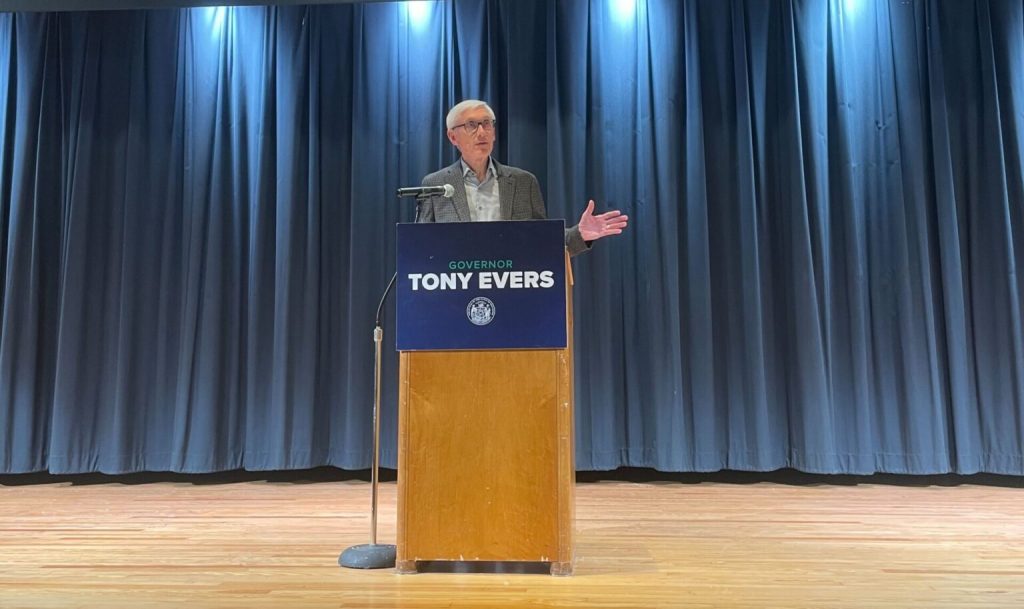Many Issues Raised At Evers’ Budget Listening Session
Concerns include housing costs, prison reform and 'humanitarian crisis' for refugees.

Gov. Tony Evers kicks off a budget listening session in Appleton, Wis. on Monday, Dec. 2 | Photo by Andrew Kennard
Members of the public traveled to Einstein Middle School in Appleton Monday to tell Gov. Tony Evers about their priorities for Wisconsin’s 2025-2027 budget.
During the first of Evers’ five planned listening sessions around the state ahead of his next budget proposal, Wisconsin residents expressed concern about the cost of housing, Wisconsin prisons and other issues in a breakout group attended by the Examiner.
In opening remarks, Evers expressed support for addressing “long neglected” priorities and cited Wisconsin’s budget surplus of over $4 billion for the 2024 fiscal year.
Evers said his priorities include expanding BadgerCare, legalizing marijuana, protecting access to reproductive health care, gun and justice reform, protecting the environment and investing in kids and schools.
Local Republican state Rep. Ron Tusler (R-Harrison) has a different view on the surplus, Fox 11 reported. He wants to use it to return money to taxpayers and provide relief from inflation.
Members of the public split into six breakout groups. Each group focused on different topics relevant to the budget. The Examiner attended the “Strong & Safe Communities” group, which addressed issues ranging from affordable housing to Wisconsin’s prison system.
A De Pere resident brought up the high cost of housing, saying that she and her husband are from Door County but couldn’t afford to live there even though they both work. Even in De Pere, “all the houses in my neighborhood are getting bought up and flipped,” she said.
Tom Denk, who was formerly incarcerated, said he wants to see change in Wisconsin prisons. He said he wasn’t allowed access to enrichment programs in prison.
“The DOC needs more funding because their staff need to be educated. They need to have that trauma-informed care,” Denk said. “Because most people are going to get out of prison. I’m one of them.”
Substance abuse and anger management programs in the Wisconsin prison system have waitlists in the thousands. The Department of Corrections’ website says the agency tries to enroll people in programming as they get close to their release date.
Karen Winkel, a homeless prevention specialist, said many of her clients have been recently released from the Department of Corrections or the Green Lake County Jail, with “no place to go. There’s no place to live.”
Lisa Cruz, executive director of Multicultural Coalition, Inc., said her nonprofit is overwhelmed with serving immigrants and refugees.
“It’s [a] humanitarian crisis,” Cruz said. “And I think we often think about that happening somewhere else, in another country, maybe in another state. It’s right here and it’s right now.”
Members of the group expressed concerns about American Rescue Plan funding running out, including funding for services for crime victims. Wisconsin passed $10 million in funding for victim services earlier this year, but providers are still facing budget cuts.
“My agency received a 72% reduction, really impacting nearly half of our budget,” said Isabel Williston, executive director of ASTOP Sexual Abuse Center.
Jared Hoy, secretary of the Wisconsin Department of Corrections, attended the group discussion, but mostly listened since the focus was on the public’s input.
An informational packet distributed at the event described positions the governor has taken on criminal justice. These include increasing funding for Wisconsin’s TAD (treatment alternatives and diversion) program and addressing staffing shortages that have worsened conditions in state prisons.
Evers will introduce his budget proposal early next year, Communications Director Britt Cudaback told the Examiner in late October. In his remarks, Evers praised Wisconsin’s new legislative maps as more reflective of the “will of the people.” In last month’s election, the maps helped Democrats flip 14 previously Republican-held seats in the Legislature, narrowing Republican majorities.
Evers’ next listening session is Wednesday evening in La Crosse, followed by Milwaukee, Ashland and a virtual session.
Members of the public can submit comments on budget priorities through the governor’s constituent services page.
At Evers’ budget listening session, concern about ‘humanitarian crisis,’ justice system was originally published by Wisconsin Examiner.





















Listening sessions is a wonderful idea, though I would like to see more locations. What about hosting some zoom listening sessions?
Mk, they have a link for a zoom session right in the article… look for the virtual session link…